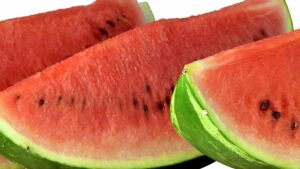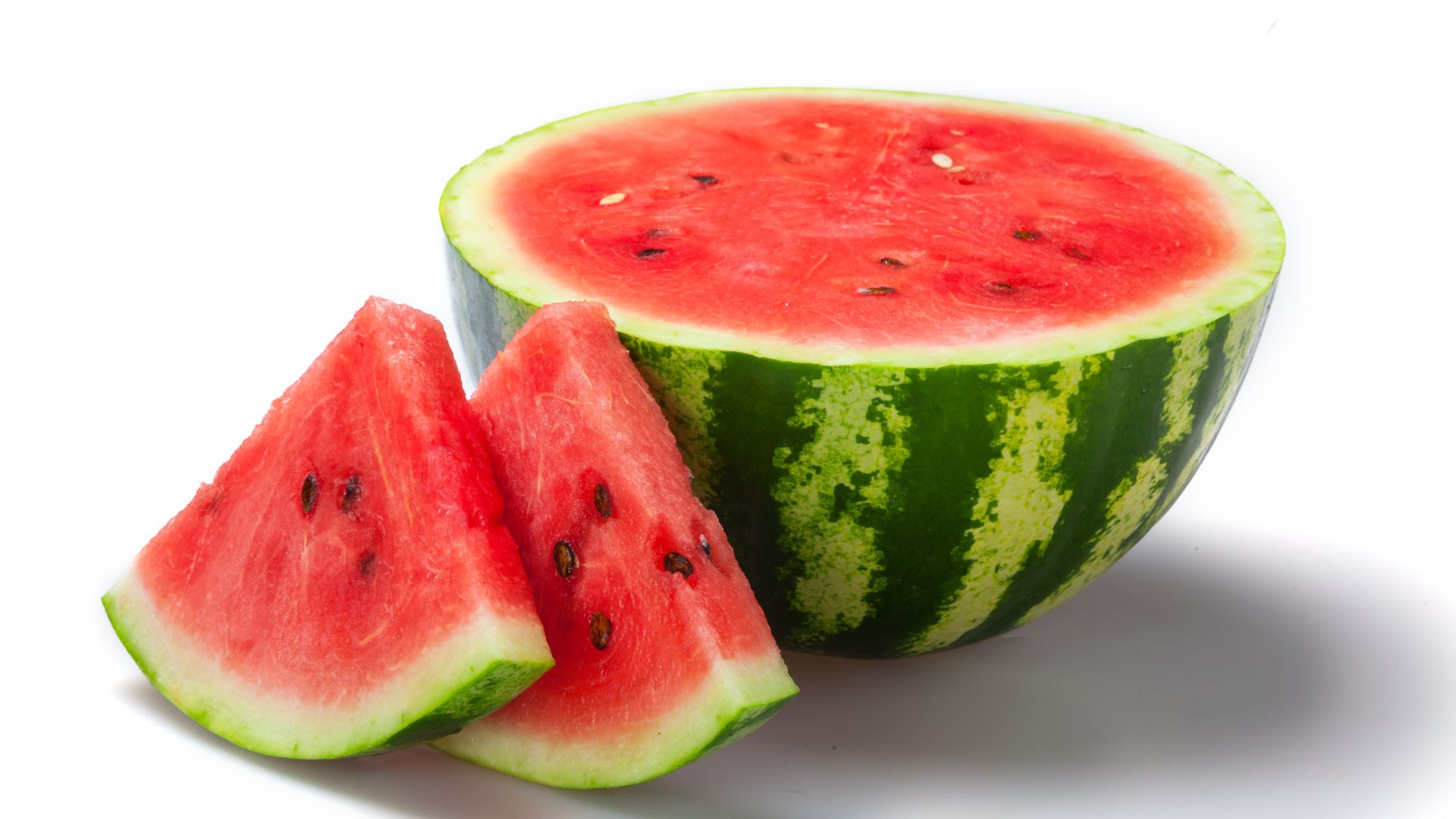Squatting is a foundational exercise for building strength, muscle, and improving overall fitness. The idea of consuming specific foods, like watermelon, for a “perfect body” while squatting is intriguing.
Let’s delve into the relationship between watermelon and squats to understand if this juicy fruit holds the key to achieving your fitness goals.
Understanding the Importance of Nutrition in Exercise
Before focusing on watermelon’s role, it’s essential to grasp the significance of nutrition in exercise. A balanced diet fuels your body, providing energy, aiding recovery, and supporting muscle growth. Proteins repair and build muscle tissues, carbohydrates fuel workouts, fats provide sustained energy, while vitamins and minerals play crucial roles in various bodily functions.

The Benefits of Watermelon
Watermelon is a delicious and hydrating fruit composed mainly of water, making it an excellent choice for staying hydrated during workouts. It’s rich in vitamins A, C, and B6, and contains antioxidants like lycopene, which may aid in reducing muscle soreness and inflammation post-exercise. Additionally, its natural sugars provide a quick energy boost.
Hydration and Performance
Staying hydrated is crucial during exercise, including squats. Dehydration can hinder performance, leading to fatigue, reduced endurance, and even muscle cramps. Watermelon’s high water content, combined with essential electrolytes, can contribute to maintaining proper hydration levels, supporting optimal performance during squats.
Squats and Muscle Building
Squats engage multiple muscle groups, including the quadriceps, hamstrings, glutes, and core. They promote strength, power, and muscle growth, making them a cornerstone exercise in many workout routines.
Nutrition for Muscle Growth
While watermelon offers hydration and some nutrients beneficial for exercise, achieving a “perfect body” with squats relies more on a holistic approach to nutrition. Protein intake is vital for muscle repair and growth. Foods like lean meats, eggs, dairy, legumes, and nuts are excellent sources of protein that aid in maximizing the benefits of squats for muscle development.
So,.. The Role of Watermelon in Squatting
Watermelon, with its hydrating properties and nutrient content, can be a refreshing addition to your diet, especially during workouts like squats. However, it’s crucial to view it as part of a comprehensive nutrition plan rather than a magical solution for a “perfect body.”
Consuming watermelon to stay hydrated and enjoy its nutritional benefits can complement your fitness journey. Remember, achieving fitness goals involves a combination of proper nutrition, consistent exercise, rest, and hydration.
So, while munching on watermelon can certainly contribute positively to your workout routine, focusing on a well-rounded diet that supports your overall fitness goals is key.
Resources:
- Hydration and Exercise – Mayo Clinic
- The Role of Nutrition in Muscle Building – Harvard Health Publishing
- Importance of Electrolytes During Exercise – Healthline
Moving forward
Feel free to incorporate watermelon into your diet for its hydrating and nutrient-rich qualities, but remember, it’s the overall balance that shapes your journey towards a healthier and fitter body.
Let’s explore further.
Fine-Tuning Your Nutrition for Squats and Overall Fitness
1. Balance and Variety:
2. Pre-Workout Nutrition:
3. Post-Workout Recovery:
4. Hydration Matters:
5. Consistency and Patience:
6. Consult a Professional:
Final Thoughts
Squats are a fantastic compound exercise that contributes to building strength, muscle mass, and overall fitness. While watermelon offers hydration and certain nutrients beneficial for workouts, achieving a “perfect body” through squats requires a holistic approach to nutrition and exercise.
So, enjoy watermelon as part of a balanced diet that supports your fitness journey. Pair it with a variety of nutrient-dense foods, proper hydration, and a consistent exercise routine for optimal results.
Remember, your journey to a healthier and fitter body is a marathon, not a sprint. Embrace the process, stay committed to your goals, and celebrate each milestone along the way.
Resources:
- Balanced Diet for Athletes – Academy of Nutrition and Dietetics
- The Importance of Pre and Post-Workout Nutrition – Healthline
- Benefits of a Balanced Diet – Medical News Today
Strive for a balanced approach to nutrition and exercise, and you’ll be well on your way to achieving your fitness goals while savoring the occasional watermelon slice.
Here’s a comparison table summarizing the key aspects of incorporating watermelon and a balanced diet into your fitness routine when squatting:
| Aspect | Watermelon | Balanced Diet |
|---|---|---|
| Hydration | High water content aids in hydration during workouts. | Provides various sources of hydration (water, fruits). |
| Nutrient Profile | Rich in vitamins A, C, B6, antioxidants like lycopene. | Diverse nutrients from proteins, carbs, fats, vitamins. |
| Immediate Energy | Natural sugars provide quick energy boost. | Offers sustained energy from complex carbs and fats. |
| Muscle Repair/Growth | Limited protein content, more focused on hydration. | Protein-rich foods aid in muscle repair and growth. |
| Overall Contribution | Hydration and some nutrients beneficial during exercise. | Provides a comprehensive nutritional profile for fitness. |
| Role in Fitness Goals | Complementary for hydration and quick energy. | Essential for overall health, muscle growth, and energy. |
| Importance | Supporting hydration during workouts. | Vital for holistic health and fitness goals. |
Remember, while watermelon offers specific benefits, a well-rounded diet remains crucial for achieving fitness goals, especially when incorporating squats into your routine.
Wrapping up
In the pursuit of a healthier, fitter you, embracing the goodness of watermelon alongside a balanced diet can be a refreshing and beneficial choice. While watermelon’s hydration and nutrients contribute positively during workouts like squats, it’s essential to view it as part of a broader approach to nutrition and fitness.
Squats, paired with a comprehensive diet rich in proteins, carbohydrates, fats, vitamins, and minerals, can propel you toward your fitness aspirations. Consistency, dedication, and a holistic view of nutrition and exercise will undoubtedly pave the way for progress.
So, relish the hydrating sweetness of watermelon while focusing on a diverse, nutrient-packed diet. Strive for balance, stay committed to your goals, and savor the journey toward a healthier and stronger you. Cheers to a deliciously fruitful fitness adventure.

Hey there, it’s Mike Rrsq, the Editor-in-Chief over at Jsquat.com, and I’m absolutely obsessed with all things squat fitness! I’ve been lucky enough to get some serious recognition for my work in this field. With a solid background in the fitness and wellness industry, I’ve been there right from the get-go, helping shape this website into what it is today.
You see, I’m not just the boss around here; I’m also a passionate contributor. I love sharing my insights through my articles, and trust me, they’re not your run-of-the-mill stuff. Each piece I write is a labor of love, filled with my expertise and real-world experience in the fitness universe. So, if you’re into fitness and looking for some inspiration, you’re in the right place!

